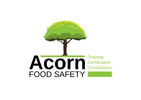What is a Food Allergy?
|
Acorn TCCA qualified Food Technologist and Accredited Trainers providing technical support and accredited training courses in all aspects of Food Safety Archives
January 2018
Categories |
HoursMon - Fri: 9am - 5pm
|
Telephone+44 7516 090911
|
|
